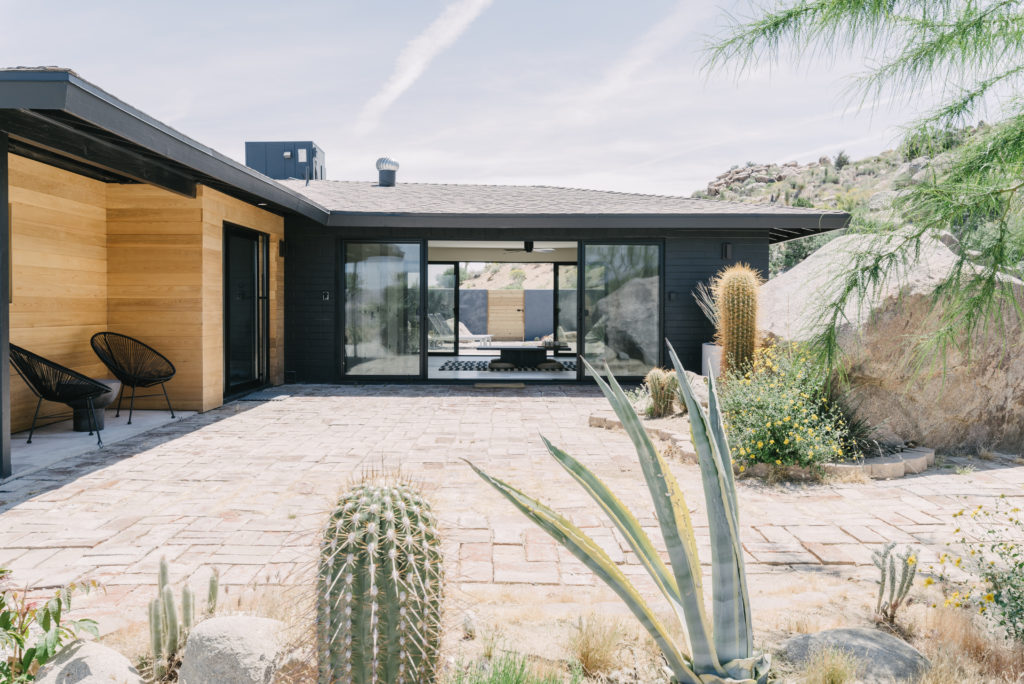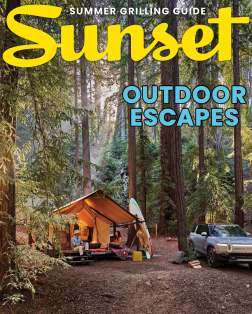
How to Score Major Deals to Furnish Your Airbnb
Stop sending guests lists of product links and make more money off your space.

Courtesy of Villa Kuro
Calls ring out from a family of desert quails, who are skirting through purple prickly pear no matter where I stand, on the dirt paths that wind around my Airbnb.
As if golden hour weren’t magic enough—the sun stretching its rays toward the mountains that trace the California horizon in the distance—the birds’ presence is a reminder that tonight I’m resting my head in one of the most majestic places on earth.
I wish I could bottle up the feeling that grounds me when I’m in the desert. So much of it must be experienced firsthand. But there is a new platform trying to make it possible to take parts of the experience home.
The quails are wayward residents of Villa Kuro, an immaculately serene retreat nestled into the boulders that have come to symbolize the town of Joshua Tree. Walk through the door and immediately you’re greeted by a white-walled living room and kitchen with date-palm pendants, oversized woven baskets, and jars of loose-leaf teas.

Stanley Yang Photography

Stanley Yang Photography

Stanley Yang Photography
“Nature plays a big part in our design style and approach,” say Elaine Chao and Stanley Yang, the owners and designers behind the space who also helm interior design firm Mini Inno.
“The desert landscape of Joshua Tree is just so breathtaking that we didn’t want to distract from anything on the interior to take away from its beauty,” the duo continues. “The design theme was kept very tonal, minimal, and earthy. All windows and glass doors were designed to frame the exterior views.”
Wander through the hallways and you’ll find a tearoom replete with jute floor pillows and a ceramic kettle set, two bedrooms with soft, neutral linens, and outdoor courtyards where a hot tub and cactuses await. Bench-seat nooks face the boulder-clad hill behind the house where it’s common to see roadrunners, jackrabbits, even desert tortoises. You’ll also find a small pamphlet with a barcode that’s easily scanned with your phone, which leads to a portal with a list of decor and furniture items plus pricing and a link to have them shipped to your own door before you’ve even left.

Stanley Yang Photography

Stanley Yang Photography

Stanley Yang Photography
It’s there that I find out the slate black coasters where I’ve set my tea are just $15 for a set of four from Crate & Barrel. And the Breville Temp Select Kettle that will heat to different temperatures based on whether I’ve brewed white or green tea is $100. It’s where many guests have gone to purchase their own bottles of the Aromaland shampoo, conditioner, and soap in the bathrooms, ranging from lemongrass and sage to rosemary and mint.
The integration comes from the company Minoan, which aims to make it easier for guests to interact with various products and purchase the ones they like—and make it easier for hosts to outfit their spaces with everything from high-quality furnishings to snacks. In what is billed as a “native retail” experience, hosts can purchase products online at a discount and receive a 50-50 split with Minoan if guests purchase something through the customized portal list.
Sleeping on a mattress for a night as opposed to looking at it on a screen, for example, is valuable not just for guests and consumers but also for brands and hosts, according to Minoan CEO and founder Marc Hostovsky. Hosts are “not just a customer,” they’re marketing partners—and that necessitates a different kind of economic relationship, the founder adds.
“The moments that are being created between people and products in those spaces are super special and very valuable,” Hostovsky says. “The hosts aren’t getting credit for the value of those moments.”
How It Works
Short-term rental hosts are like OG influencers, particularly those who meticulously curate their space.
“You don’t have to own a hotel to be a hospitality professional,” says Hostovsky. “There’s a lot of people who take that personally and do a really good job. They think about all these little details of the guest experience. They don’t need to have a crazy budget but they’re willing to invest in having nice products in their home.”
Previously in e-commerce at Jet and then Walmart, Hostovsky founded Minoan in part due to a stay at a short-term rental where he “fell in love with everything,” from a wall-mounted knife set to the sheets. So much so that he went back and forth with the host to get a list of resources, finding no easy way to purchase everything he wanted.
“This is what brands want,” he recalls thinking at the time. “They’re trying to create moments of inspiration. You [hosts] are creating these moments and you’re getting nothing for it.”
Minoan was born.
Interested hosts can apply to work with the company through its website, where staff are looking for “people who are focused on curating a euphoric experience,” Hostovsky says. Once approved, you can then install a Google Chrome extension that’s integrated into brand partner sites like Crate & Barrel, Pottery Barn, West Elm, and a lot more. There are nearly 200 brands to choose from with a handful getting added every month, according to Hostovsky. Just in the time it took to write this story, I got an email announcing the addition of Fluff Co. towels and bedding and Our Place plates and glassware, among others, starting anywhere from 35% to 45% off.
The goal is to offer enough product diversity that Minoan homes don’t have the same cookie-cutter look and feel, Hostovsky says. And not all of your decor needs to be bought through the company. At Villa Kuro, for example, I still messaged Chao and Yang to find out where they got their stunning date palm kitchen pendants. (Spoiler alert: It’s Couleur Locale.) But gathering information about a lot of other products was a breeze.
“Minoan initially reached out to us and right away we knew it was a great fit,” say Chao and Yang, whose backgrounds are in fashion e-commerce and who had already planned to have a shop connected to the space. It had already become common for their guests to reach out about certain products after a stay, and the pair previously sent brand links “one by one,” they add.
“Guest feedback on this experience has been very positive, and they say it’s a fun and super-easy way to browse and shop,” the duo adds. “For hosts, it really makes the property even more immersive and streamlined.”

Sunset’s Outdoor Living Issue 2022
More from this issue:
- 3 Cabins, 3 Styles: Is This the Ultimate Forest Hideaway?
- These Road Trips Aren’t Just Epic, They Can Be Done in an Electric Car
- Bikepacking 101: Why You Should Try It and How to Get Started
- Feeling the Heat? Try These Drought-Tolerant Plants in Your Garden Now
- Go Ahead, Forage Your Own Food. But First Know the Rules
Discounts can range depending on the brand; because furniture shipping margins are thin, the reduction there may be less than for, say, linens. Currently, hosts can place items in their cart to be sent for a quote from Minoan. All the discount calculation happens on the back end, which can be tough if you’re hoping to budget in real-time. Hostovsky says it’s structured that way to streamline all receipts, shipping information, and tracking notifications in one place; but the team is currently working on integrating estimates earlier in the process.
If you’re wondering how Minoan makes money—the company doubled its revenue from September 2021 to this past January and by five times since, according to Hostovsky—it’s “entirely brand-funded” through marketing fees and commissions from the brands. In addition to short-term rentals, the team also works with more than 60 boutique hotels.
In the future, you may see Minoan creating these types of “shoppable” experiences in restaurants, waiting rooms, or co-working spaces, really anywhere that “meaningful moments are happening,” Hostovsky says. But in the meantime, they’re laser-focused on hospitality. Hot spots include markets near big cities, like Fredericksburg, Texas, and Joshua Tree.
“A lot of the growth in tourism is this focus on experiences,” Hostovsky says. “The attention economy is the most valuable industry out there. We don’t think about these big companies like this, but they are markets for attention. They have your attention and they’re selling your attention, whether or not you want to see it that way.
“What we’re really interested in is: What about all the really intimate moments of attention that happen in these experiences that are so rich?”
